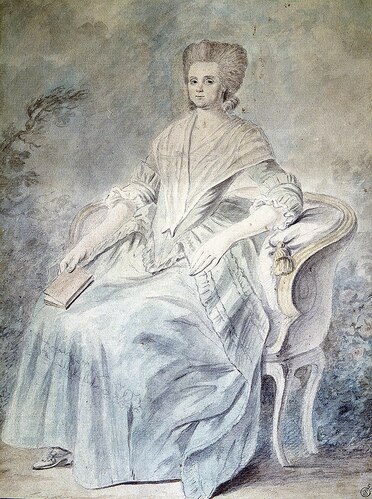
The Declaration of the Rights of Man and of the Citizen was adopted in 1789 by the National Constituent Assembly (Assemblée nationale constituante), during the French revolution. Prepared and proposed by the Marquis de Lafayette, the declaration asserted that all men "are born and remain free and equal in rights" and that these rights were universal. The Declaration of the Rights of Man and of the Citizen became a key human rights document and a classic formulation of the rights of individuals vis-a-vis the state. The Declaration exposed inconsistencies of laws that treated citizens differently on the basis of sex, race, class, or religion. In 1791, new articles were added to the French constitution which extended civil and political rights to Protestants and Jews, who had previously been persecuted in France.
In 1790, Nicolas de Condorcet and Etta Palm d'Aelders unsuccessfully called on the National Assembly to extend civil and political rights to women. Condorcet declared that "he who votes against the right of another, whatever the religion, color, or sex of that other, has henceforth abjured his own".
In October 1789, women in the marketplaces of Paris, rioting over the high price and scarcity of bread, began to march to Versailles, often called the Women's March on Versailles. While not solely an attempt for the extension of natural and political rights to women, the demonstrators believed that equality among all French citizens would extend those rights to women, political minorities, and landless citizens. Although upon the march, the king acknowledged the changes associated with the French Revolution and no longer resisted such liberal reforms, the leaders of the Revolution failed to recognize that women were the largest force in the march, and did not extend natural rights to women.
In November 1789, in response to both the Declaration of the Rights of Man and of the Citizen and the failure of the National Assembly to recognize the natural and political rights of women, a group of women submitted a petition for the extension of egalité to women, referred to as the Women's Petition to the National Assembly. While thousands of petitions were repeatedly submitted to the National Assembly, this one was never brought up or discussed. The French Revolution did not lead to a recognition of women's rights, and this prompted de Gouges to publish the Declaration of the Rights of Woman and the Female Citizen, published September 15 1791.
The text:
DECLARATION OF THE RIGHTS OF WOMAN AND THE FEMALE CITIZEN
To be decreed by the National Assembly in its last sessions or in those of the next legislature.
PREAMBLE
Mothers, daughters, sisters, representatives of the Nation, all demand to be constituted into a national assembly. Given that ignorance, disregard or the disdain of the rights of woman are the only causes of public misfortune and the corruption of governments [they] have decided to make known in a solemn declaration the natural, inalienable and sacred rights of woman; this declaration, constantly in the thoughts of all members of society, will ceaselessly remind them of their rights and responsibilities, allowing the political acts of women, and those of men, to be compared in all respects to the aims of political institutions, which will become increasingly respected, so that the demands of female citizens, henceforth based on simple and incontestable principles, will always seek to maintain the constitution, good morals and the happiness of all.
As a result, the sex that is superior in beauty as it is in courage during the pains of childbirth recognizes and declares, in the presence and under the auspices of the Supreme Being, the following Rights of Woman and the Female Citizen.
I
Woman is born free and remains the equal of man in rights. Social distinctions can only be founded on a common utility.
II
The purpose of all political organizations must be the protection of the natural and imprescriptible rights of Woman and Man: these rights are liberty, property, security and above all the right to resist oppression.
III
The principle of sovereignty is vested primarily in the Nation, which is but the union of Woman and Man: no body, no individual, can exercise authority that does not explicitly emanate from it.
IV
Liberty and justice exist to render unto others what is theirs; therefore the only limit to the exercise of the natural rights of woman is the perpetual tyranny that man opposes to it: these limits must be reformed by the laws of nature and reason.
V
The laws of nature and reason forbid all acts that are harmful to society: anything not forbidden by these wise and divine laws must be allowed and no one can be constrained to do what the laws do not demand.
VI
The law must embody the will of the majority; all Female and Male citizens must contribute personally, or through their representatives, to its development; it must be the same for one and all: all Female and all Male citizens, being equal in law, must be equally entitled to all public honors, positions and employment according to their capacities and with no other distinctions than those based solely on talent and virtue.
VII
No woman may be exempt; she must be accused, arrested and imprisoned according to the law. Women, like men, will obey this rigorous law.
VIII
The law must only establish punishments that are strictly necessary, and none can be punished other than by a law established and promulgated prior to the offence, and legally applied to women.
IX
The law will rigorously pursue any woman found to be guilty.
X
None must be disquieted for their opinions however fundamental: woman is entitled to mount the scaffold; she must be equally entitled to mount the rostra so long as her manifestos do not disturb the public order according to the law.
XI
The free expression of thoughts and opinions is one of the most precious rights of woman given that this liberty ensures the legitimacy of fathers and their children. Any Female citizen can therefore freely declare ‘I am the mother of your child’ without a barbarous prejudice forcing them to hide the truth, unless in response to the abuse of this freedom in cases determined by the law.
XII
Guaranteeing the rights of woman and the female citizen will be a great benefit: this guarantee must be instituted for the good of all and not just to benefit those individuals to whom it is entrusted.
XIII
Women and men are to contribute equally to the upkeep of the forces of law and order and to the costs of administration: woman shares all the labor, all the hard tasks; she should therefore have an equal share of positions, employment, responsibilities, honors and professions.
XIV
Female and male citizens have a right to decide for themselves, or through their representatives, the necessity of public contribution. Female citizens can only subscribe to it if they are allowed an equal share not only of wealth but also of public administration and in determining the amount, assessment, collection and duration of the tax.
XV
The collective of women, joined to that of men for the purposes of taxation, has the right to demand of any public agent an account of its administration.
XVI
No society can have a constitution if rights are not guaranteed, or the separation of powers not determined; the constitution is worthless if the majority that make up the Nation has not participated in its redaction.
XVII
Property belongs to both sexes, united or separated; for each it is an inviolable and sacred right; no one can be deprived of a true natural heritage unless a general necessity, legally verified, obviously requires it and on condition of a fair indemnity agreed in advance.
POSTSCRIPT
Woman, wake up; the tocsin of reason is resounding throughout the universe: acknowledge your rights. Nature's powerful empire is no longer surrounded by prejudice, fanaticism, superstition or untruth. The light of truth has dissipated all the clouds of nonsense and usurpation. Enslaved man increased his power and had to have recourse to yours in order to break his fetters. Freed he became unjust towards his companion. Oh women! Women, when will you cease to be blind? What advantages have you gained through the Revolution? A greater scorn, a more pronounced disdain. During the centuries of corruption you only reigned over the weakness of men. Your empire is destroyed: what is left to you? The conviction that men are unjust? Reclaim your heritage, that right founded on the wise decrees of nature; what can you fear from such a fine undertaking? A witticism from the Governor of the Feast of Cana? Are you afraid that our French Governors, correctors of an inappropriate morality that was too long caught up in the branches of politics, will say repeatedly: women, what have we got in common? Everything, you must reply. If, in their weakness, they should obstinately allow such inconsequentiality to get in the way of their principles then courageously oppose their vain claims of superiority; unite under the banner of philosophy; use all your innate energy and you will soon see these haughty men, our slavish admirers, [not?] grovelling at your feet but proud to share with you the treasures of the Supreme-Being. Whatever barriers are thrown in your way it is in your power to overcome them; you simply have to want to. Let us move on and reflect on the frightful position that women held in society; given that a system of national education is now being contemplated, let us see if our wise Legislators will be rational in their consideration of the education of women.
Women have done more harm than good. Constraint and dissimulation have been their lot. What force stole from them, ruse returned; they had to resort to the power of their charms and the most irreproachable man could not resist. All was submitted to them, poison, the sword; they commanded over crime as over virtue. The French government, in particular, depended for centuries on the nocturnal administration of women; secrets could not withstand the indiscretion of the boudoir: ambassadors, officers, ministers, presidents, pontiffs, cardinals, all that characterizes the stupidity of men, sacred or profane, all was subject to the cupidity and ambition of this sex once despicable yet respected but since the revolution, respected and despised.
What an opportunity this sort of antithesis offers me for commentary! I have only a moment to make it known but the moment will fix the attention of the most distant posterity. Under the ancien régime everything was deceitful, everything was shameful yet is it not possible to perceive an improvement in things even in the substance of these vices? A woman had only to be beautiful and amiable; when she possessed both advantages a hundred fortunes would be spread at her feet. If she did not take advantage of them she was deemed to be odd or of an unusual bent that encouraged her to despise riches: she was then reduced to being considered awkward. The most indecent woman became respectable through gold; the commerce of women was a sort of trade that was accepted in the highest circles which, from now on, will have no credit. If it still had any then the revolution would be lost and, in new relations, we would still be corrupted: yet can reason pretend that all other paths to fortune are closed to a woman purchased by a man, like a slave on the coasts of Africa. The difference is great; that is understood. The slave commands the master, but if the master frees the slave with no recompense at an age when the slave has lost all her charms, what becomes of this unfortunate woman? The plaything of scorn, even the doors of generosity close on her; she is poor and old, they say, why did she not understand how to make a fortune? Other even more touching examples come to mind. A young inexperienced person, seduced by a man she loves, will abandon her parents to follow him; the ingrate will abandon her after a few years, the longer she has aged with him the more inhuman his inconstancy; if she has children, he will abandon her anyway. If he is rich he will consider himself exempt from sharing his fortune with his noble victims. If some agreement ties him to his duty he will violate its power in expectation that the law will be tolerant. If he is married any other agreement becomes worthless. What laws are still to be created in order to extirpate vice at its root? One that will share wealth, and public administration, between men and women. It is obvious that she who is born of a rich family will gain much from an equal partition. But she who is born of a poor family, with merit and virtue, what is her lot? Poverty and opprobrium. If she does not excel specifically in music or painting she can hold no position in public even though she has all the capabilities to do so. I want only to give an overview of how things stand, I will go into greater depth in the new edition of my political works that I plan to offer the public in a few days, with notes.
I take up my text again with regard to morals. Marriage is the tomb of trust and love. A married woman can, with impunity, give bastards to her husband and a fortune that is not theirs. The unmarried woman only has the feeblest rights; ancient and inhuman laws forbid her the right to the name or wealth of the father of her children and no new laws have been devised to address this matter. If trying to give my sex an honorable and fair substance seems, at this time, paradoxical on my part, like attempting the impossible, then I will leave the glory of treating on this matter to the men to come but, while we wait, we can pave the way through national education, the reestablishment of morals, and by addressing conjugal conventions
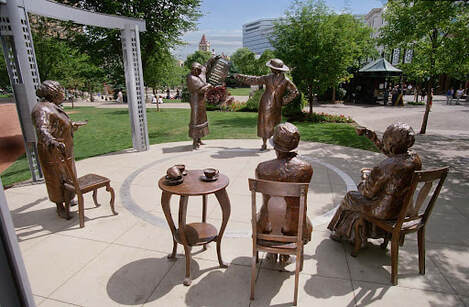
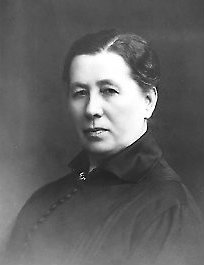
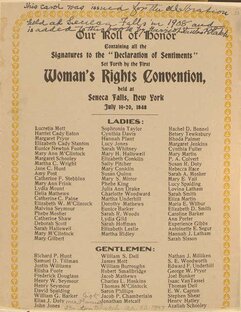
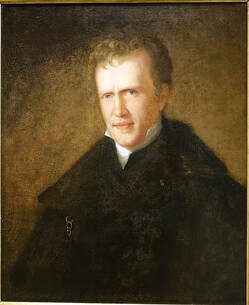
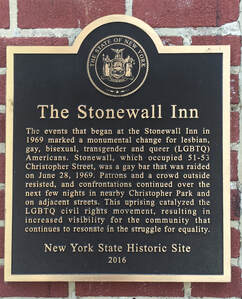
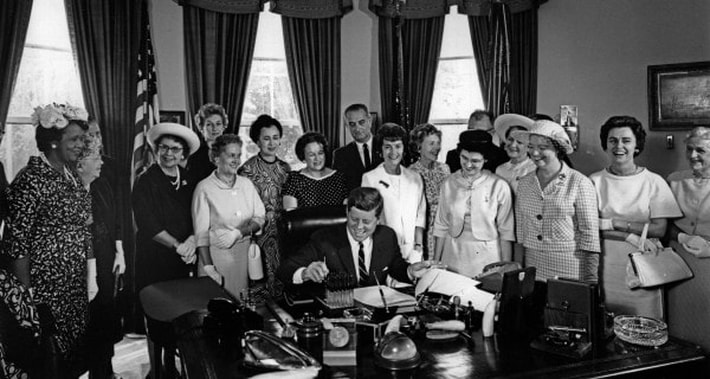
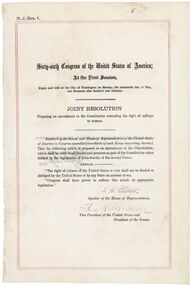
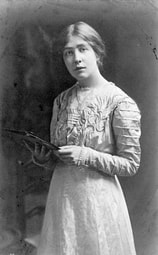
 RSS Feed
RSS Feed